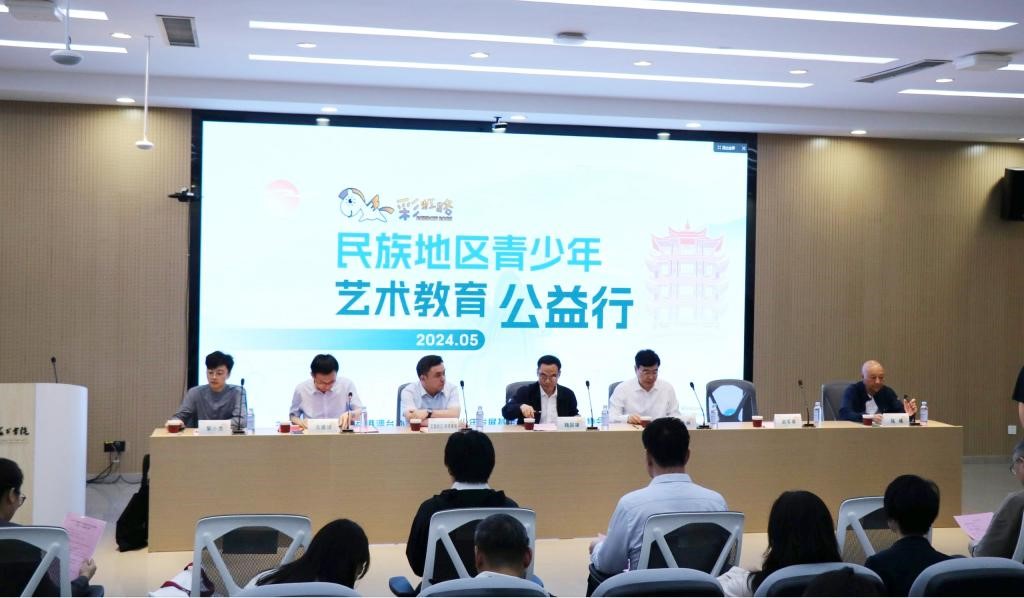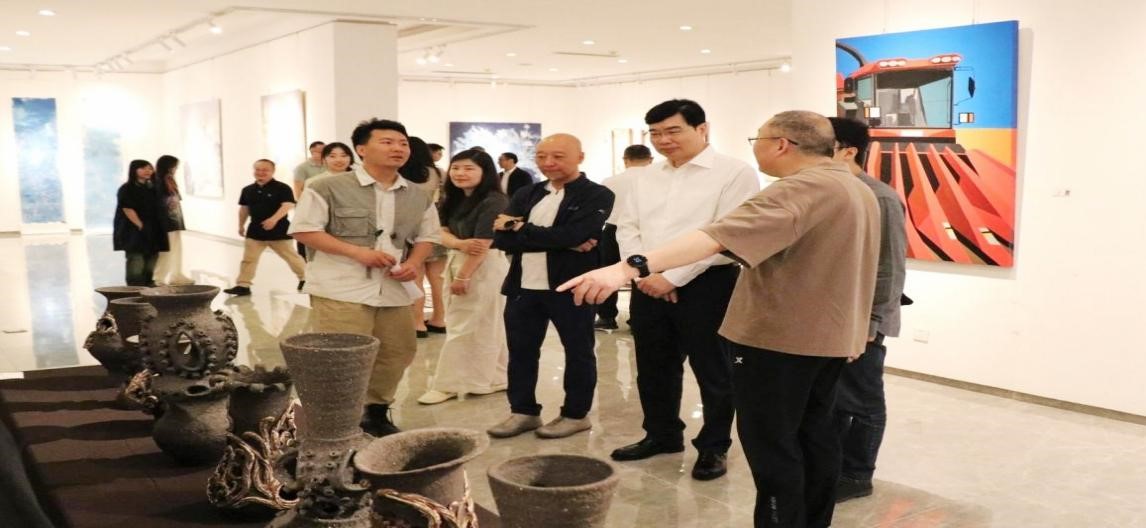On the morning of May 27th, the launching ceremony for the “Rainbow Road – 2024 Youth Art Education Public Welfare Tour in Ethnic Regions” was held at SCMU’s Optics Valley Art Gallery. The event is co-organized by the Hong Kong, Macao and Taiwan Affairs Office of the National Ethnic Affairs Commission, the China Youth Development Foundation, the Macao Art Association, and SCMU, with over 10 artists and young art teachers from Macao in attendance.
Wei Guoxiong, Director of the Hong Kong, Macao and Taiwan Affairs Office of the National Ethnic Affairs Commission, Aierkenjiang Abulati, Standing Committee Member of the Party Committee and Deputy Secretary-General of the China Youth Development Foundation, Lu Xi, President of the Macao Art Association, Li Xiaojie, President of the Macao Youth Art Association and Team Leader of “Rainbow Road”, Zhao Junzhang, Member of the Party Group and Deputy Director of the Ethnic and Religious Affairs Commission of Hubei Province, Li Jinlin, President of SCMU, Fang Debin, Standing Committee Member of the Party Committee and Vice President of SCMU, attended the event. Fang Debin presided over the launching ceremony.

Launching Ceremony in Progress. Photographed by Zhang Yuke
In his welcome speech, Li Jinlin expressed that the university will take strengthening the sense of Community for the Chinese nation as the main focus, proactively leverage its strengths and advantages in inheriting and preserving Chinese culture, and further deepen cooperation with Macao artists in areas such as field sketching, art exhibitions, academic activities, and talent cultivation, contributing positive efforts to the “Rainbow Road” public welfare initiative.
In his remarks, Wei Guoxiong stated that the “Rainbow Road” public welfare activity, aimed at “enhancing the artistic cultivation of youth in ethnic regions and inheriting and promoting outstanding traditional Chinese arts”, reflects the patriotic sentiments of people from all walks of life in Macao, actively integrating into the country’s development and supporting the art education cause in ethnic regions. Lu Xi noted that the “Rainbow Road” public welfare activity has helped Macao artists gain a deeper understanding of the rich and ancient ethnic cultures of the motherland, broadening their horizons and perspectives, and promoting cultural exchanges and understanding. It has gradually become a brand project for educational and cultural exchanges between Macao and Chinese mainland. After the launching ceremony, attending leaders and guests visited the outstanding works exhibition of the 2024 graduating class of the Academy of Fine Arts and participated in an exchange seminar at the Academy of Chinese National Community.

Visiting the Exhibition of 2024 Graduating Class from the Academy of Fine Arts.
Photographed by Zhang Yuke
Subsequently, the public welfare team will travel to the Enshi Tujia and Miao Autonomous Prefecture, visiting the sponsored Huangnitang Primary School in Bajiao Dong Township of Enshi City, Banliyuan Primary School in Lijiahe Town of Xuanen County, and Zhusha Minzu Primary School in Tuanbao Town of Lichuan City, conducting art classes and organizing field visits and sketching activities.
It is worth noting that the “Rainbow Road – Youth Art Education Public Welfare Tour in Ethnic Regions” is a public welfare initiative jointly launched in 2013 under the guidance of the National Ethnic Affairs Commission, by the Ethnic Programs Center of China National Radio, the China Ethnic Minorities’ Foreign Exchange Association, the China Youth Development Foundation, and the Macao Art Association. The activity aims to gather artists and caring individuals from Chinese mainland, Hong Kong, Macao, Taiwan, and overseas to engage in artistic creation activities in ethnic regions, organize exhibitions, charity sales, and establish a special fund under the China Youth Development Foundation with the proceeds. The funds will be used to support the construction of “Rainbow Road Happy Art” and “Rainbow Road Happy Music” classrooms in rural primary schools in ethnic regions.
Edited by Liu Qiong, reviewed by Lei Changsheng, May 27, 2024